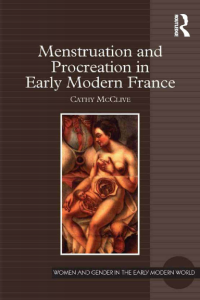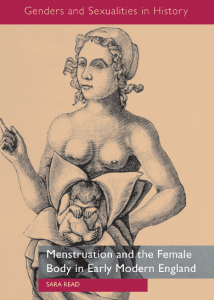Menstruation in Early Modern England and Early Modern France
 Obviously, menstruation has been around a long time, and while its biological purpose has been constant, its cultural significance and social construction have taken on innumerable meanings across time and space. Yet, probably due to skewed gender perspectives, taboos, and prejudices, the meanings of menses, what I think of as “the menstrual ecology,” has received relatively scant attention by historians of cultural practice. Recent efforts to redress that absence are found in two fascinating studies: Cathy McClive’s Menstruation and Procreation in Early Modern France (2015, Ashgate) and Sara Read’s Menstruation and the Female Body in Early Modern England (2013, Palgrave).
Obviously, menstruation has been around a long time, and while its biological purpose has been constant, its cultural significance and social construction have taken on innumerable meanings across time and space. Yet, probably due to skewed gender perspectives, taboos, and prejudices, the meanings of menses, what I think of as “the menstrual ecology,” has received relatively scant attention by historians of cultural practice. Recent efforts to redress that absence are found in two fascinating studies: Cathy McClive’s Menstruation and Procreation in Early Modern France (2015, Ashgate) and Sara Read’s Menstruation and the Female Body in Early Modern England (2013, Palgrave).
 Taken together, these two volumes offer insights into the often surprising ways both French and English societies strove to make sense of this seemingly gender exclusive phenomenon. Among the many enlightening insights the authors offer is McClive’s challenge to what she calls “the myth of menstrual misogyny,” the idea that menstruation has always been viewed negatively, a notion she convincingly refutes. And Read’s examination of the role New Testament Biblical scripture played in shaping menstrual attitudes provides one answer as to why Christian beliefs surrounding the period diverged from those prevailing in the other two Abrahamic faiths.
Taken together, these two volumes offer insights into the often surprising ways both French and English societies strove to make sense of this seemingly gender exclusive phenomenon. Among the many enlightening insights the authors offer is McClive’s challenge to what she calls “the myth of menstrual misogyny,” the idea that menstruation has always been viewed negatively, a notion she convincingly refutes. And Read’s examination of the role New Testament Biblical scripture played in shaping menstrual attitudes provides one answer as to why Christian beliefs surrounding the period diverged from those prevailing in the other two Abrahamic faiths.
Though both books are published by academic presses and, unfortunately, are unlikely to find wide readerships in the general public, they are well written and accessible to any curious reader. And in case contemporary scholars and activists are prone to think they are the first to grapple with the multifaceted meanings and prejudices that comprise the menstrual milieu, McClive and Read provide historical perspectives that are both useful and enlightening.
A more detailed review of each book can be found in the Society for Menstrual Research journal Women’s Reproductive Health:
Review of Menstruation and the Female Body in Early Modern England
Review of Menstruation and Procreation in Early Modern France
David Linton is an Emeritus Professor at Marymount Manhattan College. He is also Editor of the SMCR Newsletter and a member of the re: Cycling editorial board. His research focus is on media representations of the menstrual cycle as well as how women and men relate to one another around the presence of menstruation.


Thank you for introducing me to these two new texts! I have recently begun to delve more deeply into the history of menstruation, by reading “Menstruation in Twentieth-Century America” by Lara Freidenfelds, which I also found quite enlightening with respect to the ideals of the ‘progressive’ woman always available for (re)productive functions.